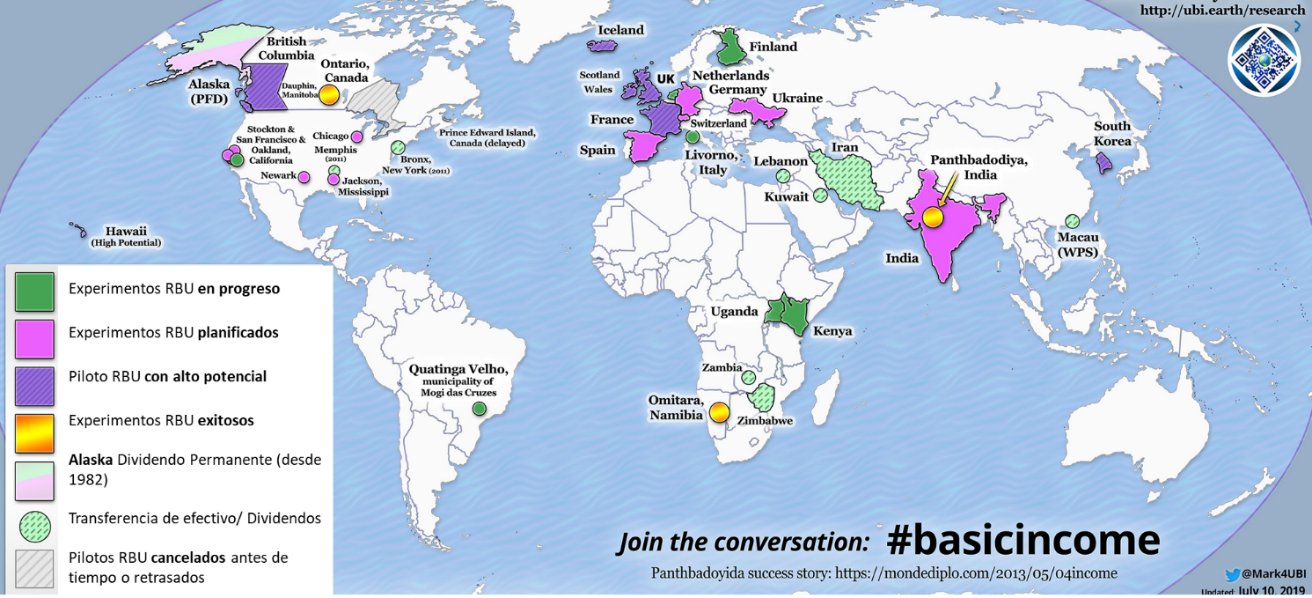LEGAL ENVIRONMENT/ Romina Mitidieri (MDPO'20)
And what is the RBU? According to the portal GiveDirectyis a cash payment, recurrent, guaranteed, unconditional and unconditional requirements, for each member of society, and which is sized to meet basic needs.
According to a publication in the Stanford Hub dedicated to RBUpublication, it takes different forms in different historical and geographical contexts. It varies according to its funding, level of payment, the frequency of payment and the particular policies proposed around it. Each of these parameters is critical.
Technically, and according to the portal Basic Incomethe RBU has five characteristics:
1. Periodic: paid at regular intervals (e.g. monthly), not as a one-off subsidy .
2. Cash payment: through an appropriate means of exchange , allowing those who receive it to decide what they spend it on. It is not paid in kind (such as food or services), or in vouchers intended for a specific use.
3. Individual: it is paid on an individual basis and not, for example, by household typology.
4. Universal: paid to all, without compliance with requirements.
5. Unconditional: paid without the need to work or demonstrate a willingness to work.
This concept is nothing new. We can find arguments in favour of the RBU since the end of the 18th century and from different points of view (Thomas Paine, Friedrich von Hayek, Milton Friedman, Martin Luther King, Philippe Van Parijs). But in recent years, discussion has been reopened as a result of the growing inequality across the globe. According to the recent report World Social 2020, published by the UN, the concept is nothing new.For example, the richest 1% of the population has accumulated more money, while the poorest 40% have 25% less income.
What would happen if every month, every person received a cheque from the government with enough money to live on? Would people stop working? Can we afford it? Would it eliminate poverty? These are some of the central questions about the RBU that are being asked from the portal GiveDirecty.
Most recently, it has been promoted by influencers such as: Elon Musk, Mark Zuckerberg, Jack Dorsey and even the Pope Francis. And there is an international group of promoters called BIEN (Basic Income Earth Network).
In addition, they have been carried out experiments and programmes by several countries (as shown in sample in Figure 1) and organisations, such as Y Combinator y GiveDirectly have launched privately funded experiments in the United States and East Africa, respectively.

However, according to the working paper Universal Basic Income proposals in light of ILO standards: Key issues and global costing(Ortiz, Behrendt, Acuña-Ulate & Nguyen, 2018), the existing evidence clarifies some aspects of its possible impacts, but does not provide a complete picture of the social and economic implications of implementing a UBI. So far, no country has initiated a comprehensive RBU at a level sufficient to guarantee a social protection floor.
As has been written (Yirka, 2019) some experiments show that people who benefited from this subject of financial aid were not discouraged to continue working or looking for a job employment. Others, such as the most recent case from Finland, show the opposite.
However, as argued by the authors of the book Basic Income A Radical Proposal for a Free Society and a Sane Economy, 2017. (Parjis and Vanderborght, 2017, pp.138), to date no strict RBU has ever been implemented, there have only been experiments in controlled groups, so it is likely that the behaviour of these small groups of people would be different from that of a whole community receiving this income.
Those who promote it propose its application as an immediate measure to eliminate poverty and the consequent promotion of individual freedoms. In Zuckerberg's wordsWe should be a society that measures progress not just by economic metrics like GDP. We should explore ideas like the RBU to ensure that everyone has a cushion on which to try new things, because entrepreneurs succeed only when they have the chance to fail. It is therefore important to redefine the idea of equality, so that everyone has the freedom to work on great projects and to find their purpose.
The International Monetary Fund work pointed out earlier this year that there were already 200 million unemployed people in the world and that more than 650 million workers live in extreme poverty. In the wake of Covid19, International Monetary Fund it has declared that the world is heading for an even deeper recession than that caused by the 2008 global financial crisis.
Undoubtedly, the biggest obstacle to the implementation of a Basic Income in Spain is its financing. In a study entitled A model for financing the Basic Income for the whole of the Kingdom
of Spain: yes, it can be done and it is rational.(Arcarons, Domènech, Raventós & Torrens, 2014) notes that the few existing programs of study estimate the net cost to be around 18.7% of GDP, so that huge tax increases would be required to finance it even in the presence of powerful economic growth, but concludes that it is feasible (provided certain structural changes in the public expense are applied).
And although its feasibility in Spain (or in other countries) can be analysed by the corresponding professionals, both the reduction of structural poverty and the consequent incorporation of the poorest people into the economic system are (or should be) pressing needs for states, and the RBU should therefore be urgently considered as an instrument for achieving these objectives.